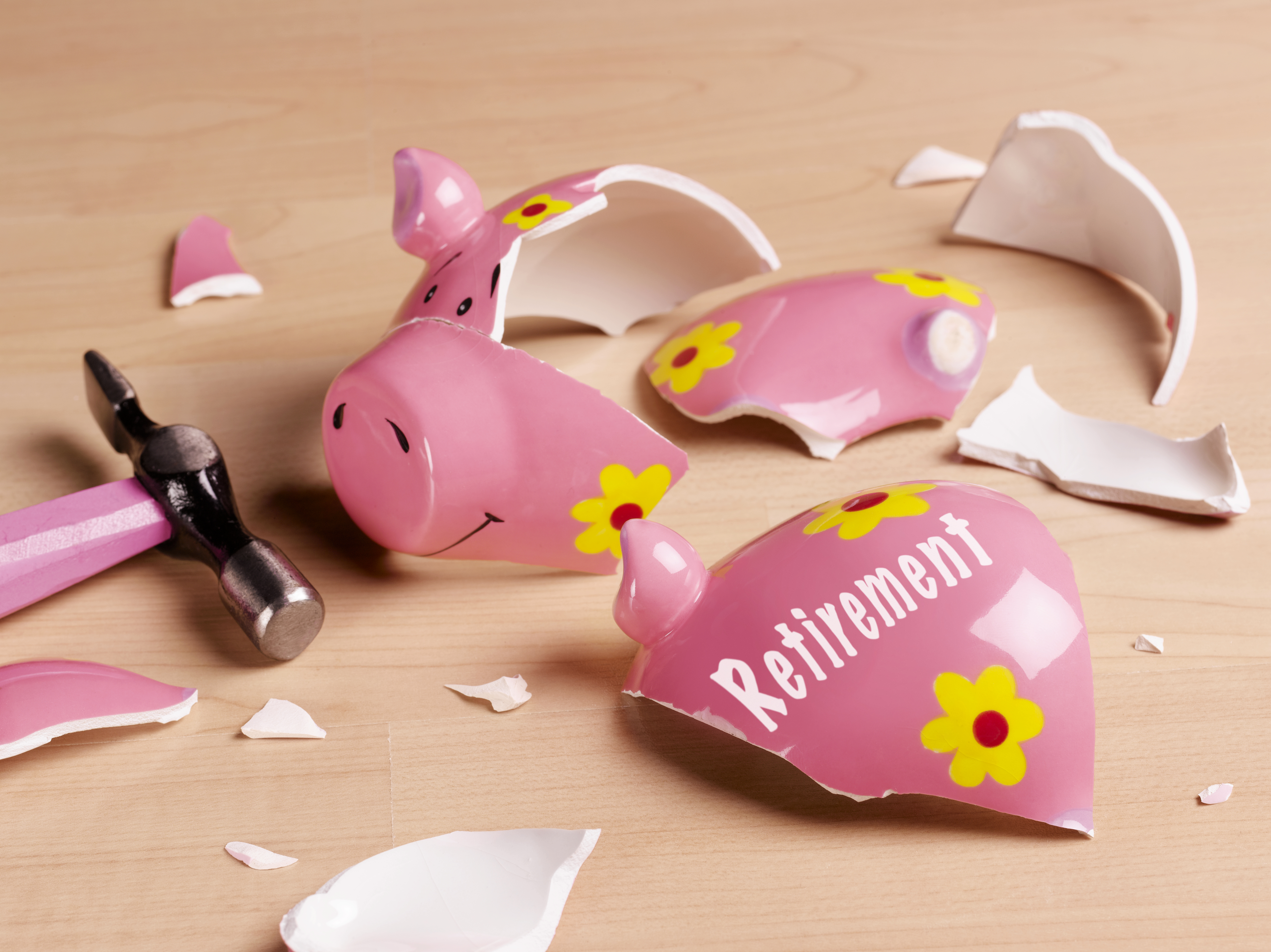A guide to cashing out your retirement accounts
Does order matter? What's the best strategy for taxes?


A free daily email with the biggest news stories of the day – and the best features from TheWeek.com
You are now subscribed
Your newsletter sign-up was successful

After decades of saving for retirement, the time to cash out will finally arrive. This might sound simple, but just like saving for retirement, there's some strategy involved if you want to make the most of your funds.
Part of how you approach your retirement plan withdrawals will depend on what types of accounts you have. It also will depend on the rules for your employer's plan. For instance, some may allow you to withdraw money in scheduled installments, such as every month or quarter, while others may permit you to take out partial withdrawals whenever you want. You'll want to make sure not to overlook taxes either — otherwise, you could end up saying goodbye to a large chunk of your retirement funds.
To ensure you make the most of your hard-earned savings, here are four guidelines to keep in mind when making withdrawals in retirement.
The Week
Escape your echo chamber. Get the facts behind the news, plus analysis from multiple perspectives.

Sign up for The Week's Free Newsletters
From our morning news briefing to a weekly Good News Newsletter, get the best of The Week delivered directly to your inbox.
From our morning news briefing to a weekly Good News Newsletter, get the best of The Week delivered directly to your inbox.
Pay attention to the rules for RMDs
No matter what else you do, make sure to follow the rules for required minimum distributions, or RMDs. Once you reach the prescribed age, you must start taking out a minimum amount from retirement accounts like 401(k) plans and traditional IRAs. You'll need to do this the year you turn 72 (or 70 1/2 if you reach that age prior to Jan. 1, 2020).
If you neglect to follow the rules and take on-time RMDs, you'll get hit with a 50 percent penalty. That penalty will apply to the difference between how much you withdrew and how much you were supposed to withdraw. "Because of the penalty, RMDs should be your first stop when tapping your retirement portfolio," Hayden Adams, CPA, CFP, and director of tax planning at the Schwab Center for Financial Research told Charles Schwab.
Do note, however, that in certain circumstances, you may be able to delay RMDs.
Note the upsides of keeping money in your retirement plan
While this might sound contradictory, given the above tip advises taking money out when you're told to do so, this piece of advice applies to the rest of your retirement funds. According to Kiplinger, "[l]eaving money in your 401(k) plan after you retire can have significant benefits."
A free daily email with the biggest news stories of the day – and the best features from TheWeek.com
In part, this is due to the fact that these plans offer access to institutional-class shares of mutual funds, which Kiplinger notes "typically charge lower fees than the retail versions." This is especially true for those who have a Thrift Savings Plan, which is the retirement plan for employees of the federal government. Further, many 401(k) plans offer a stable bond fund, which are an alternative money market funds with low risk.
So instead of entirely cashing out, you'll want to make withdrawals based on your budgetary needs, overall retirement income plan, and the predicted length of your retirement.
Remember that the order of withdrawals matters if you have multiple accounts
"Knowing when and how to draw on your various assets can have a big impact on how much in taxes you'll owe from year to year," Kiplinger says. While the exact plan of action can vary somewhat based on each person's individual circumstances and sources of retirement income, here's the general order of operations that Kiplinger recommends:
- First: Non-qualified or taxable accounts, like checking and savings accounts, standard or joint brokerage accounts, and joint savings accounts
- Second: Tax-deferred accounts, like traditional IRAs, 401(k) plans, and 403(b) plans
- Last: Roth IRAs and Roth 401(k) plans
Even more specifically, experts largely agree that Roth IRAs should be dead last in order of withdrawal. This is because Roth IRAs, unlike Roth 401(k) plans, are not subject to withdrawals, and withdrawals are tax-free (including for an heir if you leave Roth IRA to one).
Still not convinced? Bankrate breaks it down: "Consider what happens if a 72-year-old person takes $18,000 out of a traditional IRA, while sitting in the 24 percent tax bracket: They'll owe $4,320 in taxes. If they withdraw the same amount from a Roth, they won't pay a dime. But if this person doesn't have to take an RMD from a Roth IRA, and instead earns 7 percent annually on the account for another 10 years, it would grow to $35,409."
Consider using an IRA to your advantage
Kiplinger makes the case for the unique advantages of IRAs, or individual retirement accounts, for retirees. Rolling over your 401(k) into an IRA is definitely something you'll want to do after leaving your job if your plan "charges high fees and is stocked with poor-performing funds." But that's not the only reason to consider shifting to an IRA, per Kiplinger.
For one, "[y]ou can select which funds to sell when you make a withdrawal — something your 401(k) plan administrator likely won't let you do," Daniel Lash, a CFP with VLP Financial Advisors, in Vienna, Va. tells Kiplinger. He explains that plans generally "take an equal amount from each fund in the portfolio."
And if you have multiple IRAs, consolidating them into one IRA can make for less work in your retirement years, as you'll more easily know the amount of your required RMD distributions.
Becca Stanek has worked as an editor and writer in the personal finance space since 2017. She has previously served as the managing editor for investing and savings content at LendingTree, an editor at SmartAsset and a staff writer for The Week. This article is in part based on information first published on The Week's sister site, Kiplinger.com
New Tax Rules for 2023: Download your free issue of The Kiplinger Tax Letter today. No information is required from you.
Becca Stanek has worked as an editor and writer in the personal finance space since 2017. She previously served as a deputy editor and later a managing editor overseeing investing and savings content at LendingTree and as an editor at the financial startup SmartAsset, where she focused on retirement- and financial-adviser-related content. Before that, Becca was a staff writer at The Week, primarily contributing to Speed Reads.
-
 Switzerland could vote to cap its population
Switzerland could vote to cap its populationUnder the Radar Swiss People’s Party proposes referendum on radical anti-immigration measure to limit residents to 10 million
-
 Political cartoons for February 15
Political cartoons for February 15Cartoons Sunday's political cartoons include political ventriloquism, Europe in the middle, and more
-
 The broken water companies failing England and Wales
The broken water companies failing England and WalesExplainer With rising bills, deteriorating river health and a lack of investment, regulators face an uphill battle to stabilise the industry
-
 How your household budget could look in 2026
How your household budget could look in 2026The Explainer The government is trying to balance the nation’s books but energy bills and the cost of food could impact your finances
-
 What is a bubble? Understanding the financial term.
What is a bubble? Understanding the financial term.the explainer An AI bubble burst could be looming
-
 The FIRE movement catches on as people want to retire early
The FIRE movement catches on as people want to retire earlyIn the spotlight Many are taking steps to leave the workforce sooner than usual
-
 Who wants to be a millionaire? The dark side of lottery wins
Who wants to be a millionaire? The dark side of lottery winsIn The Spotlight Is hitting the jackpot a dream come true or actually a nightmare?
-
 How can you find a financial adviser you trust?
How can you find a financial adviser you trust?the explainer Four ways to detect professionals who will act in your best interest
-
 What should you consider when choosing a financial adviser?
What should you consider when choosing a financial adviser?The Explainer The right person can be a big help with financial planning, investing, taxes and more
-
 What Biden's IRA means for EV tax credits: 2024 updates
What Biden's IRA means for EV tax credits: 2024 updatesThe Explainer Which cars are eligible and how much money can owners save?
-
 How to ensure you don't outlive your retirement savings
How to ensure you don't outlive your retirement savingsThe Explainer Your golden years should be enjoyed. Don't let finances get in the way.
